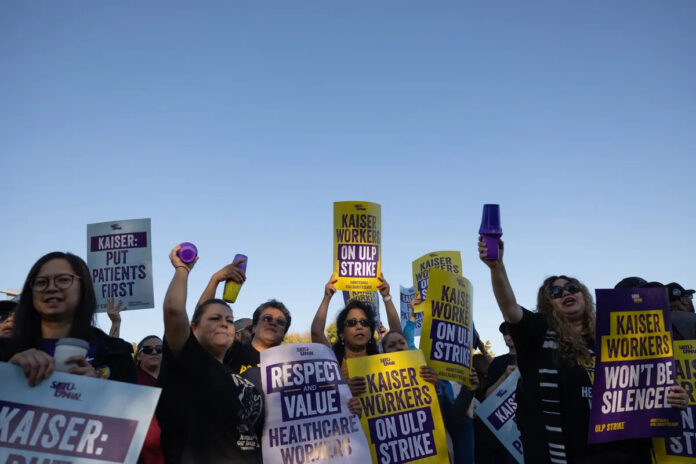Health care workers fed up with low pay, burnout and understaffing walked out on Kaiser Permanente twice in 12 months, disrupting care and compelling the health giant to hire thousands of temporary workers.
The company’s blue collar unions put Kaiser on notice two weeks ago that they were preparing to walk out again in the first week of November, raising the stakes as negotiations continued.
Faced with that threat, Kaiser Permanente late last week announced what the Biden administration called a “historic” contract with the union coalition representing its lowest-paid workers, promising steep raises over the next four years.
It was the latest in a string of scorching labor wins in California this year.
In fact, unions did so well in the Capitol that the Kaiser contract wasn’t even the biggest labor victory for health care workers at the end of last week. That designation went to the law Gov. Gavin Newsom signed instituting a new minimum wage for health workers and gradually raising the floor to $25 an hour over a decade.
Kaiser workers will achieve that milestone faster under the contract the health care giant announced Friday, which raises pay for some 68,000 California workers by 21% through 2027.
Kaiser Vice President and Chief of Human Resources Greg Holmes said the terms of the deal help the organization maintain its reputation as “one of the best places to work in health care.” The company plays an outsize role in California health care, where it serves more than 9 million patients.
“We believe this new contract will actually help us continue to have some of the best employees … and with those employees we’ll be able to deliver on our mission of providing high quality, affordable and accessible health care to our members,” Holmes said.
But that optimism for Kaiser’s workforce didn’t come easily.
Less than a week before reaching a deal, more than 75,000 Kaiser workers in four states staged a three-day strike, protesting acute staffing shortages and accusing Kaiser of engaging in unfair labor practices. The short but disruptive strike led to patient appointment cancellations across the country and required Kaiser to hire thousands of temporary workers. Labor leaders said it was the largest health care worker strike in U.S. history.
Just 12 months ago, a strike by mental health workers similarly disrupted the company. Thousands of therapists and other mental health clinicians at Kaiser’s Northern California facilities walked out for 10 weeks, protesting high case volumes, months-long delays in patient care and widespread burnout.
The prolonged strike resulted in reduced caseloads, additional guaranteed time with patients, and a commitment from Kaiser to hire more therapists, but not before the state opened an investigation into the health care giant’s practices. That investigation concluded last week with a $200 million settlement, including a $50 million fine from the state.
U.S. labor secretary mediated contract talks
Acting U.S. Secretary of Labor Julie Su, who mediated the final tense negotiations last week between Kaiser and its blue-collar unions, said the latest agreement was a testament to labor’s power.
“Collective bargaining works. It may not always look pretty, but unions have throughout our nation’s history built the middle class,” Su said during a press briefing Friday. “And it’s through agreements like this one. President Biden and I support workers’ right to organize.”
U.S. Vice President Kamala Harris praised the recent Kaiser deal, too, in a message on X, the social media platform formerly known as Twitter. “The President and I strongly believe in the collective bargaining process, and we know that when unions are strong, our nation is strong,” Harris said.
Kaiser’s union coalition represents more than 85,000 workers in six states and Washington, D.C., but the coalition’s largest footprint is in California. About 90% of Kaiser’s workforce is in California, where it operates more than 500 health facilities and three dozen hospitals.
Dave Reagan, president of SEIU-United Health Workers West, the largest of the coalition unions, said the deal helps reestablish Kaiser as an industry leader for patients and workers.
“Although it’s been bumpy, and we’ve obviously had our challenges, there is a commitment on the part of the unions that comprise the coalition to genuinely say to Kaiser, we want to rebuild the partnership,” Reagan said.
‘Stability’ at Kaiser Permanente
Before the statewide minimum wage deal was announced, Steve Shields, Kaiser’s senior vice president of national labor relations, said Kaiser executives decided bumping California wages to $25 was the “right thing to do” especially for employees on the lowest end of the wage scale.
“Irregardless of the legislation, internally we looked at this and said this makes sense,” Shields said.
Union leaders say the salary increases and other commitments from Kaiser will create “long-term stability” for a workforce that has struggled with high turnover from the COVID-19 pandemic in addition to increased inflation. Hundreds of thousands of health workers have left the profession since 2020, according to the U.S. Bureau of Labor Statistics.
“We have reached a tentative agreement that unquestionably allows this workforce to not just keep up with but exceed the cost of living that people are struggling with across the country,” Reagan said. “People under this tentative agreement can rightfully expect to make real economic progress in real terms.”
Kaiser representatives did not answer questions about how much its labor agreement is estimated to cost, although they did say that it will not lead to cost increases for Kaiser patients. According to the mental health investigation, Kaiser reported a net revenue exceeding $91.3 billion in 2022.
“It’s not our intention that this agreement will have any impact on rates. We have an obligation to members that we are delivering affordable health care. This agreement alone would not translate into changes in rates,” Shields said.



